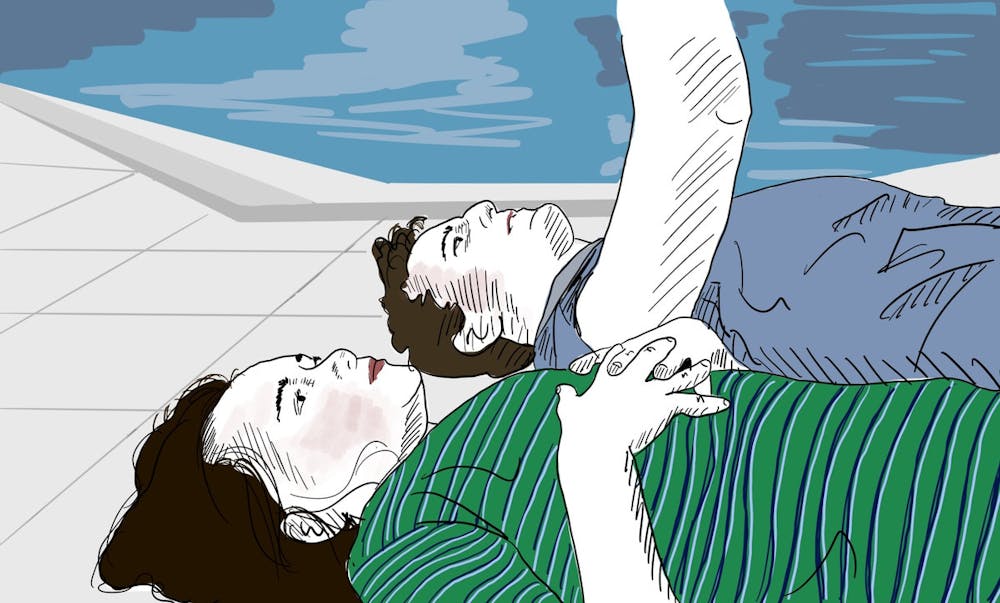It’s always exciting when a filmmaker of great reverence releases another classic work in an already impressive lineup of work. But nothing tops the thrill of discovering a rising voice entering the film scene with great promise. In her latest directorial release, “Aftersun,” Charlotte Wells establishes herself as this impressive new voice in the landscape of dramatic cinema, delivering a painfully honest exploration of memory and adolescent innocence.
At its core, “Aftersun” is concerned with the relationship between Sophie (Frankie Corio) and her loving but distant father Calum (Paul Mescal) as they vacation in Turkey. The film is primarily told from Sophie’s perspective, and footage from the 11-year-old’s DVR recording of the trip is interspersed with the main narrative. Audiences move through the film with the highly-intelligent and observant Sophie, struggling alongside her to understand her fractured family and Calum’s haunting past.
Audiences know very little about the lives of these two characters beyond the holiday destination. Instead of outwardly depicting Sophie’s school life in Scotland or Calum’s financial struggles in London following his separation from Sophie’s mother, such background information is alluded to through the film’s subtle dialogue. Audiences don’t learn the mistakes that Calum made in his life, but feel the emotional toll of them deeply. In the same way, viewers never so much as hear the voice of Sophie’s mother, but she is just as much of a presence in the film as any on-screen character.
In part, the film is a near-microscopic examination of the relationship between Sophie and her father. Audiences sense an eerie distance that Calum has from his daughter — a distance that is not from any lack of love but rather a lack of knowing what to do with that love. These interactions place viewers directly in Sophie’s shoes — they can tell that there is something wrong with Calum but feel powerless in coming up with any form of a solution.
Zooming out of its focus on Sophie and Calum’s relationship, “Aftersun” also depicts endearing moments of adolescent self-discovery as Sophie explores the low-budget resort in Turkey. She tries to hang out with an older group of “cool kids,” finds a first romance at a motorcycle race arcade game and sings a cringe-filled karaoke rendition of R.E.M.’s “Losing My Religion.” And though Sophie’s journey may be a little bit mundane, it is certainly not insignificant. These little moments are what come together to make this trip one of personal growth for her.
Occasionally, the film flashes forward to Sophie in the present day, now her father’s age at the time of the trip and looking back on home video footage recorded during that time. But the film makes sure not to dwell on these moments too long, once again only giving audiences brief impressions of Sophie’s adult life. For example, a rug that Calum saw in Turkey and loved but knew he couldn’t afford now sits in present-day Sophie’s apartment — while just a fairly standard patterned rug, its presence carries a whole story of loss behind it.
Scattered throughout the “Aftersun” are abrupt shifts to a surreal rave where Calum dances freely as adult Sophie watches from afar. At first occurrence, these scenes are confusing. But as the film’s narrative continues to unfold into a fuller picture, subsequent trips to this imaginary club become more and more impactful.
The film’s title carries a sense of haunting that perfectly mirrors its narrative. At one point early in the vacation, Sophie says to Calum that she finds comfort knowing everyone lives underneath the same sky. She tells him that simply being under the same sun makes her feel like they are together, even if they aren’t really. In isolation, this is a touching moment shared between father and daughter. But when placed in the context of this scene, the film’s title “Aftersun,” seems to ask audiences what happens in life when the sky can no longer be shared with those you loves.
The subtle emotional complexities of “Aftersun” rely heavily on the abilities of actress Frankie Corio for success. Corio, making her cinematic acting debut, delivers one of the greatest child performances in film history. Like most of the film, Corio’s acting is impactful not because of the words she says, but because of the emotions she invokes in audiences. She illuminates a quiet longing that lurks underneath the exterior of a jovial but shy young girl. And Paul Mescal, in a much-deserved Oscar-nominated performance, responds with an equally honest and complex portrayal with subtleties that linger in viewers’ minds long after the film is over.
Breaking free from the confines of a traditional narrative structure, the character-driven form of “Aftersun” helps the film stand out as a uniquely emotional experience. Wells makes sure that audiences do not feel distanced from the inner workings of the film’s central relationship. This makes many moments uncomfortable to watch, but it also makes the visceral reactions to them all the more true. “Aftersun” is unlike anything that has been made before it. At the very end of the film, each little mundane moment comes together to create a heartbreaking mosaic glimmering with painful joy.

Finn Kirkpatrick was the senior editor of multimedia of the Brown Daily Herald's 134th editorial board. He is a junior from Los Angeles, California studying Comparative Literature and East Asian Studies. He was previously an arts and culture editor and has a passion for Tetris and Mario Kart.





